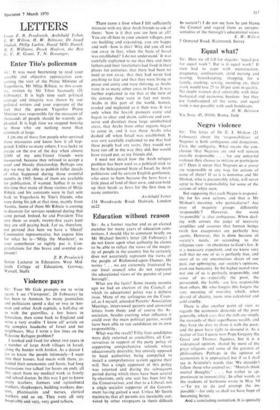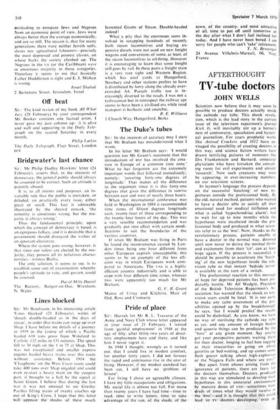Negro violence
Sir: The letter of Dr E. J. Mishan (21 February) about the 'responsibilities' of Negroes is both ambiguous and dangerous. First, the ambiguity. What means the con- clusion 'that Negroes are and will remain morally responsible . . . for any unlawful violence they choose to initiate or participate in"? Does it mean that Negroes as a group are responsible in any way for actions of some of them? If so it is nonsense and Mr Mishan, who is presumably white, will never agree to bear responsibility for some of the actions of white men.
But supposing that each Negro is responsi- ble for his own actions, and that is Mr Mishan's meaning, why particularise? Are men of majority groups differently 'responsible'? However, the word 'responsible' is also ambiguous. When deal- ing with crimes the judge of necessity simplifies and assumes that human beings (with few exceptions) are perfectly free agents. However, this is done because of society's needs, or—according to the religious view—in obedience to God's law. It is a necessary expedient. and we know very well that no one of us is perfectly free, and most of us are unconscious slaves of our past, our upbringing, our society's opinions, even our humanity. In the higher moral view not one of us is perfectly responsible, and some of us—especially the poor, the persecuted, the feeble—arc less responsible than others. He who forgets this forgets the very meaning of morality which, when devoid of charity, turns into calculated and cold cruelty.
There is also another point of view as regards the economic demands of the poor generally, which says that the rich are simply the stewards of their superfluous wealth, and they have the duty to share it with the poor, and the poor hase right to demand it. As a matter of fact I quote now Pope Gregory the Great and Thomas Aquinas, but it is a widespread opinion, shared by most of the great religions and some of the greatest of philosophers. Perhaps in the opinion of economists it is unpractical but if so I shall say in Aristotle's words that 'We shouldn't follow those who counsel us: "Mortals think mortal thoughts" . . . but rather to ap- proximate to immortality'. In other words as the students of Sorbonne wrote in May '68 —`To try to do and attempt the im- possible'—for only so shall we have hope of becoming better.
And a concluding correction. It is specially
misleading to compare Jews and Negroes from an economic point of view. Jews were always better than the average economically, and are so still. The reason is, that for many generations there were neither Jewish serfs, slaves nor agricultural labourers—precisely the most depressed and poorest classes, on whose backs the society climbed up. The Negroes in the us (or the Caribbean) were in enormous majority in those categories. Therefore it seems to me that basically Father Huddleston is right and E. J. Mishan is wrong.



































 Previous page
Previous page